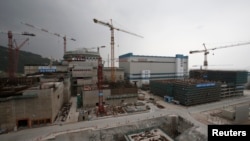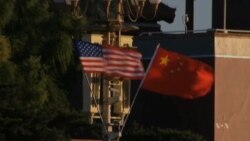U.S. nuclear security officials told lawmakers Tuesday renewing a nuclear cooperation deal with China is the "best way" for the U.S. to influence and improve China's nonproliferation record.
"Without entering into force of this successor agreement, we will lose a critical mechanism for influencing China's nonproliferation behavior," said retired Air Force Lieutenant General Frank Klotz, the Department of Energy's Under Secretary for Nuclear Security and Administrator for the National Nuclear Security Administration (or NNSA).
"We will lose potential economic advantages, and we will lose the insight that we have into China's nuclear programs, including its nuclear research and development," he said in testimony before the Senate Foreign Relations Committee.
President Barack Obama is calling on Congress to authorize the proposed 30-year extension of the pact, saying it would provide "a comprehensive framework for peaceful nuclear cooperation with China based on mutual commitment to nuclear nonproliferation."
Also testifying at the hearing Tuesday was Assistant Secretary of State for International Security and Nonproliferation Thomas Countryman.
"We would not have concluded this agreement if I were not satisfied that this was the best way to improve China's record on non-proliferation, to maintain our capability to have influence on that record," said Countryman. His statement followed a question by Committee Chairman Senator Bob Corker on why renewing the agreement is in the U.S. national interest.
Tuesday's hearing was focused on assessing "potential risks and rewards" of a new 30-year agreement. It came one day after the Senate committee's closed-door meeting with five Obama administration officials on the proposed extension.
A new agreement would permit China, the biggest nuclear power market in the world, to buy more U.S.-designed reactors and other nuclear technology to reprocess plutonium from spent fuel.
The current 30-year U.S.-China deal expires at the end of this year.
Congress has 90 days to review the agreement. If it does not act before the review period expires, the deal automatically goes into effect. Key members of the Senate Foreign Relations Committee have promised a close look at the terms, especially since the U.S. and China are the world's two biggest economic powers.
The West has been warily watching as Beijing moves to expand its interests in the South China Sea. At the same time, some in Congress question whether Beijing is living up to its commitments under international nuclear nonproliferation treaties, particularly any technology transfers to neighboring North Korea.
Henry Sokolski, Executive Director of the Nonproliferation Policy Education Center, told VOA there is reason to believe China has violated the current agreement with the U.S.
"There is a good chance China violated its end-use pledge not to divert any of the U.S. civilian nuclear technology acquired under the agreement," he said. "There is a good reason to believe that they did, and it helped their naval reactor program."
Senator Corker also addressed those concerns Tuesday, asking about the likelihood that China would use nuclear power cooperation with the U.S. to accelerate its military development.
Countryman said "there is no doubt" China will make every attempt to benefit from the technology transfer, including in the military field. But he said the job of the U.S. is to block that effort and that U.S. officials believe they have the means to do so.
Supporters of the agreement say it will bring jobs and build the U.S. civilian nuclear industry, as China purchases equipment and reactor materials. But Sokolski is skeptical of claims that extending the agreement will bring a huge economic windfall to the United States. He says companies that stand to benefit the most, while U.S.-based, are foreign-owned.
The review of the Beijing deal comes at the same time as Congress is considering contentious legislation calling for a 30-day congressional review period over a potential agreement the United States and five other world powers, including China, are negotiating with Iran to restrain Tehran's development of a nuclear weapon. The Senate has approved the measure and now the House is considering it, with Mr. Obama saying he would sign it if Congress gives its final approval.
The Congressional Research Service says U.S. nuclear commerce has increased with China over the past decade. A major U.S. company, Westinghouse, is building the first four reactors it is selling to China, with six more planned and as many as 30 more proposed.
Including the pact with China, the U.S. has nuclear power cooperation agreements with more than 20 countries, in addition to deals with Taiwan, the European Atomic Energy Community (Euratom) and the International Atomic Energy Agency.
Watch video report from Zlatica Hoke:







